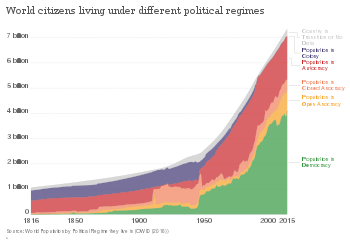Regime
In politics, a regime (also known as "régime", from the original French spelling) is the form of government or the set of rules, cultural or social norms, etc. that regulate the operation of a government or institution and its interactions with society.

Usage
While the word régime originates as a synonym for any type of government, modern usage has given it a negative connotation, implying an authoritarian government or dictatorship. Webster's definition states that the word régime refers simply to a form of government,[2] while Oxford English Dictionary defines regime as "a government, especially an authoritarian one".[3]
Contemporary academic usage of the term "regime" is broader than popular and journalistic usage, meaning "an intermediate stratum between the government (which makes day-to-day decisions and is easy to alter) and the state (which is a complex bureaucracy tasked with a range of coercive functions)."[4] In global studies and international relations the concept of regime is also used to name international regulatory agencies (see International regime), which lie outside of the control of national governments. Some authors thus distinguish analytically between institutions and regimes while recognizing that they are bound up with each other:
Institutions as we describe them are publicly enacted, relatively-enduring bodies of practice, procedures and norms, ranging from formalized legal entities such as the WTO to more informal but legally-buttressed and abiding sets of practices and regimes such as the liberal capitalist market. The key phrases here are ‘publicly enacted’ and ‘relatively enduring’. The phrase ‘publicly enacted’ in this sense implies active projection, legal sanction, and often as not, some kind of opposition.[5]
In other words, regimes can be defined as sets of protocols and norms embedded either in institutions or institutionalized practices – formal such as states or informal such as the "liberal trade regime" – that are publicly enacted and relatively enduring.[5]
References
Citations
- "World citizens living under different political regimes". Our World in Data. Retrieved 5 March 2020.
- Regime as defined in the Merriam–Webster website
- Regime as defined in the Oxford English Dictionary
- Breakdown of the GCC Initiative
- James, Paul; Palen, Ronen (2007). Globalization and Economy, Vol. 3: Global Economic Regimes and Institutions. London: Sage Publications. p. xiv.
Sources
- James, Paul; Palen, Ronen (2007). Globalization and Economy, Vol. 3: Global Economic Regimes and Institutions. London: Sage Publications.
- O'Neill, Patrick, Essentials of Comparative Government